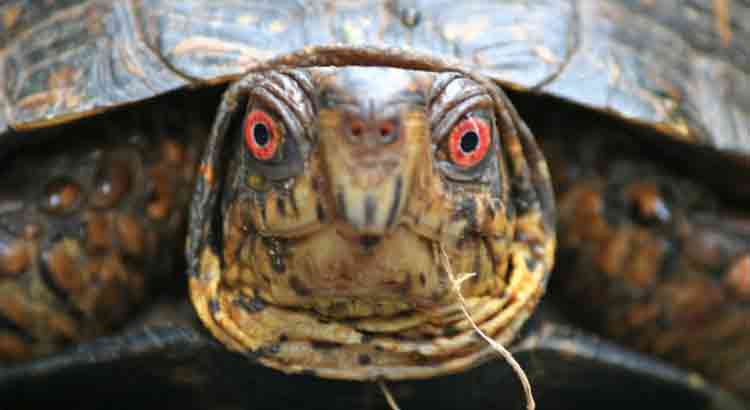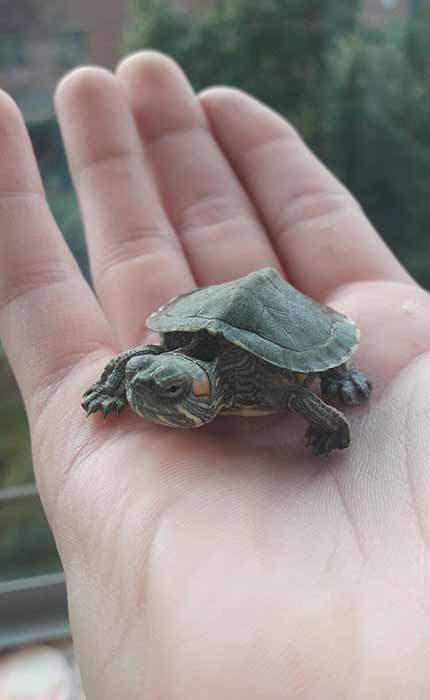Turtles are not the most communicative animal in the world, so when they try to get your attention, they usually do it for a good reason. But what about staring, are they trying to tell you something, or are they simply looking at you?
Your turtle is staring at you because it recognizes you, and it’s curious what you are doing. Turtles are intelligent creatures that are able to recognize their owners, and can show particular interests in what they are doing.
While there are a few other possible reasons why your turtle is staring at you, which we will discuss shortly, the main one is curiosity. In most cases they are simply wondering what you are doing, or what you are about to do, and sometimes they are waiting for you to do something, mainly to give them food.
What It Means When a Turtle Stares at You
The most common reason is, as I said, curiosity. Turtles are naturally very curious, and over time they establish a bond with their owner, so it’s normal for them to be curious of what you are doing. But there are a few other possibilities.
Your Turtle Is Expecting Food
Another common reasons, is that they are watching you in anticipation that you will give them food. While you are doing a lot of things for your turtle, clean the tank, change the water, buy food, water treatment, etc. Your turtle won’t notice those things, the only thing that it will really notice is when you give it food.
So, your turtle might be watching you closely, thinking that you are about to give it food. And if that is the case, they want to be able to eat it as soon as they can.
Turtles don’t do this because they are hungry, but because they are opportunistic feeders. This means that in the wild they don’t always have access to food, so they are used to eating with every opportunity that they get even if they are already full, since they don’t know when their next meal will be.
And don’t let the intense staring of your turtle convince you to give it more food. If you already have an established feeding schedule stick to it, and try to resist the urge to give it any extra, in most cases it’s not good for them. And if you don’t have a feeding schedule, or if you don’t know how much food you should give your turtle, you should check out this article: How Much and How Often Should I Feed My Turtle? +Schedule.
Boredom
Turtles can get bored, and just like we do when there is nothing to do and watch at the TV, they look at us. The only problem with this is that you moving through the room is not that interesting to your turtle. So you might want to give it something more interesting to do.
I’ve covered all the possible things that you can do in this article: Do Turtles Get Bored? The Final Answer, so if you suspect that your turtle is bored, you should check it out. And even if that’s not the case, you should still read it. There is nothing wrong with some entertainment.
The most important takeaway from the article is that getting another turtle won’t solve the problem, it can only make it worse. Turtles are very territorial and tend to fight when there isn’t enough space for all of them. Having two turtles in the same tank, requires a very big tank and a lot of extra attention.
Your Turtle Is Scared
If you just got your turtle, there is a very good chance that it’s still very scared. New pet turtles can need quite a lot of time to adjust to their new environment, and to their owners.
During this time they will be very scared. And one thing that they will do when they are scarred is keep an eye on everything that is moving and might present a danger to them. And for a turtle, humans can seem very dangerous. So your turtle might be keeping an eye on you to know if it has to run or to hide.
And while the main way a turtle will defend itself is by hiding in its shell, when they are in water they usually prefer to swim away. Despite their lack of speed on land, turtles are surprisingly fast underwater, and in most cases they can outrun any potential danger.
One other possibility is that they are staring intensely at you in order to scare you, and keep you away from them. While most turtles don’t look at all that dangerous, no matter how intensely they stare at you, in the animal world this can be a very effective technique.
Establishing Dominance
While you might not say that when you first look at a turtle, they are very territorial. So there is a chance that your turtle is trying to establish its dominance by staring at you.
Most pet turtles are quite scared when they arrive in their new home, and it will take them a while to finally figure out that nobody there is trying to harm them. Some turtles, when they figure out that their owners are harmless, will try to establish themselves as the dominant ones, and one way of doing this is by staring intensely.
Why Your Turtle Stops Staging at You When You Look Directly at It
In the animal world, staring directly into the eyes of another animal is more often than not seen as a provocation.
If your turtle was staring at you out of curiosity and not in an attempt to establish dominance, it will immediately stop staring, since it doesn’t its staring to be perceived as a provocation, or an attempt at challenging you.
What to Do When Your Turtle Stares at You
In my opinion, the best way to react when your turtle is staring at you is to simply ignore it.
Since your turtle is most likely looking at you to see what you are doing, there is nothing to do. You could stare back, but that can be perceived as something aggressive, so it’s not the best idea.
So overall, doing nothing is the best thing that you can do. The only exception to that is in case your turtle is bored, in which case you might want to add something to the tank that will provide some entertainment.
How Turtles See Their Owners
A lot of the behavior mentioned in this article is based on the idea that your turtle will know that you are their owner, you are not just some random person walking by. But, how sure can you be that your turtle recognizes you, and if it does, how does this differentiate you from any other person.
Turtles, despite not being known for their intelligence, they are in fact quite smart. So smart in fact that they can even learn to perform tricks. IF you want to know exactly how smart turtles are, you can check out this article: How Smart Are Turtles? Here’s What Science Says. So without question, turtles are smart enough to differentiate between their owner and other people.
So, now that we know that your turtle can tell the difference between you and other people, let’s see how it sees you as its owner.
This might not be what you were expecting, but they see you as the person who brings food to them, so more or less a food dispenser. I know this doesn’t sound nice at all, and it’s not what you were hoping, but you have to understand that for turtles that mean a lot. You are taking care of one of their most important needs, and that is very important for them. In reality, you are also taking care of their protection and ensuring that they have a place to bask, but there is no way for them to know that.
Because you are the person that brings food, your turtle will start to develop some trust toward you. Not trust like you and I have in other people, but I think this is a good way to describe it. The way they manifest this trust is by not being aggressive toward you and cooperating with you. For example, they will not bite you when you handle them, but if a person that they don’t recognize tries to do it, they will become aggressive toward them, or they will be scared and hide in their shell.
If you want to have a more in-depth look at how your turtle sees you and how to make your turtle friendlier toward you, check out this article: Do Pet Turtles Show Affection? (+How to Make Them Like You).
Final Thoughts
In 90% of the cases, your turtle is staring at you out of curiosity. If you take good care of your turtle, provide it with enough food and space, there is no reason to worry about it staring at you.
I hope this article answered all your questions about why your turtle is staring at you. In case you have any questions you can leave them in the comment section below, my colleagues and I regularly check the comment and answer any question that we find.


